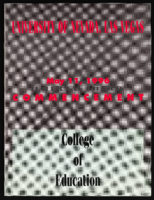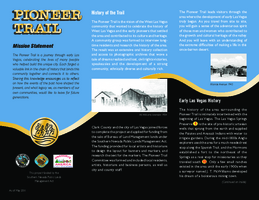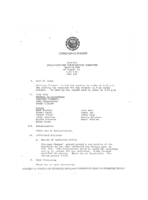Search the Special Collections and Archives Portal
Search Results
Hank Castro Music Business Records and Audio Recordings
Identifier
Abstract
The Hank Castro Music Business Records document Hank Castro's career in the music industry in Las Vegas, Nevada from 1969 to 1990. The bulk of the collection consists of original audio recordings from the Las Vegas Recording Studio. The collection also contains legal documents, personal correspondence, and promotional material related to the Las Vegas Recording Studio (1971-1985), songwriter agreements, and sheet music (the majority of the lyrics written by Hank Castro) from artists represented by the Las Vegas Recording Studio and Castro's other companies.
Archival Collection
Station Casinos Publicity Collection
Identifier
Abstract
The Station Casinos Publicity Collection (1995-2013) contains magazine articles, newsclippings, and photographs about various Station Casinos properties in Las Vegas, Nevada. A transition report published by Station Casinos in 1998 is also included.
Archival Collection
Nevada Consolidated Copper Company Records
Identifier
Abstract
The Nevada Consolidated Copper Company Records (approximately 1907-1978) contain the business records of the company, including correspondence, freight bills, ledgers, maps, leaching data, and books relating to mining. The majority of the records post-date the company's name change to Kennecott Mining Company.
Archival Collection
James Cashman Sr. Papers
Identifier
Abstract
The James Cashman Sr. Papers date from approximately 1890 to 1969 and contain correspondence, photographs, insurance records, and bank records related to Cashman and his businesses in Southern Nevada. The collection documents the lives of the Cashman family and their businesses in southern Nevada.
Archival Collection
Ruthe Deskin Papers
Identifier
Abstract
The Ruthe Deskin Papers (1933-2004) document Deskin's career as a journalist and community activist in Nevada. The papers include Deskin's "Back and Forth" columns, newspaper articles about Deskin, awards and certificates, legal documents, correspondence, photographs, obituaries and memorials, convention programs from the Nevada Press Association, and biographical ephemera. The collection also contains certificates recognizing Deskin's work with Nevada youth from Greenspun Junior High School and Ruthe Deskin Elementary School, as well as the Boy Scouts of America and the Clark County Juvenile Court.
Archival Collection

University of Nevada, Las Vegas (UNLV) College of Education 33rd commencement program
Date
Archival Collection
Description
Commencement program from University of Nevada, Las Vegas Commencement Programs and Graduation Lists (UA-00115).
Text

Brochure, Pioneer Trail of West Las Vegas community
Date
Archival Collection
Description
Brochure highlights and maps historic points of interest in West Las Vegas.
Text

Meeting minutes for Consolidated Student Senate, University of Nevada, Las Vegas, January 21, 1975
Date
Archival Collection
Description
Text

Meeting minutes for Consolidated Student Senate, University of Nevada, Las Vegas, August 09, 1983
Date
Archival Collection
Description
Text

Transcript of interview with Eva Garcia Mendoza by Elsa Lopez and Barbara Tabach, September 25, 2018
Date
Archival Collection
Description
On the corner of 7th street and Clark, and beside the tennis courts of Las Vegas Academy, stands the law office of attorney Eva Garcia Mendoza. Eva has worked in her office since 1982, and in this time she has helped the Las Vegas community work through civil and immigration cases besides aiding in a myriad of other ways. Eva Garcia Mendoza was born in 1950, in the town of McAllen, TX-an environment that perpetuated hatred of Mexican Americans. Eva recalls the racism she endured; for instance, being spanked if she spoke Spanish in school, and her family facing job discrimination because of her skin color or her last name. Being an ethnic and financial minority was difficult, and Eva remembers nights as a child when she would cry herself to sleep. Eva showed resilience in the face of adversity as she states, “you rise to the level of your teachers’ expectations.” With the encouragement of her band professor, Dr. L.M Snavely, she began higher education at Pan American College. She moved to Las Vegas in 1971 and began to work before being accepted at UNLV to study Spanish literature. She graduated in the class of 1973. In 1975, Eva applied to become a court interpreter, a decision that would drastically change the trajectory of her career. She earned the coveted position and began to work beside Judge John Mendoza who was the first Latino elected to public office in the state of Nevada. Several years later John and Eva would wed. Judge Mendoza passed away in 2011. Eva talks about how extraordinary his legacy is-from his professional achievements to a story about his v football days and the 1944 Dream Team, this true story even piqued the interest of Hollywood writers. Through her work, Eva began to notice how she was more than qualified to become a lawyer herself, so she applied and gained a full ride scholarship to the Law School of San Diego University. Eva describes the struggles of attending school in San Diego while her spouse and children were home in Las Vegas. Despite the financial difficulties, being one of few minority students, and becoming pregnant her second year, Eva was able to finish her remaining university credits by returning to Las Vegas and working with Judge Mendoza. Together, they started the Latin Bar Association. Eva began her own practice in 1981 and would later partner with Luther Snavely, who was the son of her band teacher that helped her to attend college so many years back. Today, Eva has a new partner at her office and hired her son to work as a secretary. Eva also tells of the office’s mysterious history, of which includes a ghostly figure many clients claimed to have seen in the reception room. Eva recounts many of her professional achievements, such as petitioning to start the American Immigration Lawyers Association, Nevada Chapter, representing celebrities, winning the unwinnable cases such as against the Nevada Test Site. Eva talks about current events, such as today’s immigration laws, the discriminatory practices of revoking birth certificates from those born in Brownsville, TX., and about the importance of the #MeToo movement. Eva and her family have a great fondness for Las Vegas. The support for the Latinx community in Las Vegas greatly contrasts that which she experienced as a child in southern Texas. She describes wanting to take her children and grandchildren to visit her old home in McAllen, TX where her family grew up on the “wrong side of the tracks.”
Text
